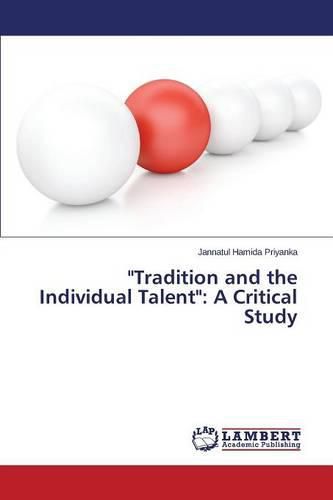Readings Newsletter
Become a Readings Member to make your shopping experience even easier.
Sign in or sign up for free!
You’re not far away from qualifying for FREE standard shipping within Australia
You’ve qualified for FREE standard shipping within Australia
The cart is loading…






This title is printed to order. This book may have been self-published. If so, we cannot guarantee the quality of the content. In the main most books will have gone through the editing process however some may not. We therefore suggest that you be aware of this before ordering this book. If in doubt check either the author or publisher’s details as we are unable to accept any returns unless they are faulty. Please contact us if you have any questions.
Tradition and the Individual Talent (1919) elaborates the concepts of tradition , individual talent and impersonality , also conveys the format of a new approach with poets of everlasting significance providing the boundaries for the assessment of the genius or the artist. Eliot disputes the common critical assertion that a poet’s greatness lies in his most individual moments, when he diverges from tradition. Eliot explains his process of depersonalization through a chemical process. He says that the mind of artist is like neutral platinum. But, what would have happened if platinum, in a sense the mind wouldn’t have taken part in that process? At another point, Eliot recommends that the emotion of poetry should be different from his personal emotion. As a reader, he may not like a poet, but the poet’s work may be liked by the reader. Then, with what the reader should deal with? For without the present there would be no past. In that case, what are the duties of the present generation to establish the present? And what are the requirements of an individual to be an individual talent? This book figures out all these answers and the principles of Eliot’s writing this essay.
$9.00 standard shipping within Australia
FREE standard shipping within Australia for orders over $100.00
Express & International shipping calculated at checkout
This title is printed to order. This book may have been self-published. If so, we cannot guarantee the quality of the content. In the main most books will have gone through the editing process however some may not. We therefore suggest that you be aware of this before ordering this book. If in doubt check either the author or publisher’s details as we are unable to accept any returns unless they are faulty. Please contact us if you have any questions.
Tradition and the Individual Talent (1919) elaborates the concepts of tradition , individual talent and impersonality , also conveys the format of a new approach with poets of everlasting significance providing the boundaries for the assessment of the genius or the artist. Eliot disputes the common critical assertion that a poet’s greatness lies in his most individual moments, when he diverges from tradition. Eliot explains his process of depersonalization through a chemical process. He says that the mind of artist is like neutral platinum. But, what would have happened if platinum, in a sense the mind wouldn’t have taken part in that process? At another point, Eliot recommends that the emotion of poetry should be different from his personal emotion. As a reader, he may not like a poet, but the poet’s work may be liked by the reader. Then, with what the reader should deal with? For without the present there would be no past. In that case, what are the duties of the present generation to establish the present? And what are the requirements of an individual to be an individual talent? This book figures out all these answers and the principles of Eliot’s writing this essay.